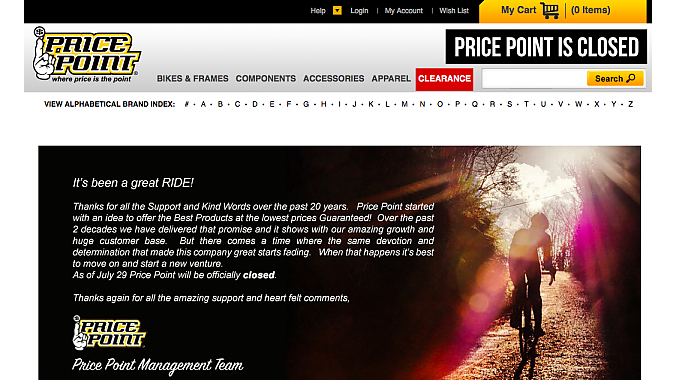RANCHO DOMINGUEZ, Calif. (BRAIN) — PricePoint.com, one of the largest e-commerce sites in the bike world, has shut down. Founder and owner Donovan Ivan told BRAIN on Friday that he has been planning the closure for almost a year after deciding he'd rather pursue other business ventures.
Ivan said he realized about three years ago that his enthusiasm was waning for the business that he started about 22 years ago. He said he spent several years trying to find the right management team to take over the business. Ivan also said he received poor advice repeatedly which went against all his instincts that made PricePoint one of the largest bike sites in the world.
Ivan saw that he was spending 90 percent of his time trying to explain the basics of running a business to his team instead of talking about building and expanding the business. He said it was then apparent to him that to continue he would have to go back to running the day-to-day operation himself, something that was no longer an interest to him.
About 10 months ago he concluded that selling off the business's assets individually — including its PricePoint.com domain and its 12 house brands and associated products — would be worth more than selling the company intact.
The website stopped accepting orders on Thursday, about five months after beginning the inventory sell-off. Ivan declined to disclose the value of the inventory sold.
"The first phase (of the shutdown) is over: selling the inventory. Now I'll be selling the domain and 12 private-label companies," he said.
Ivan started working in a bike shop — Circle Cycle in Torrance, California — when he was in college. After graduating with a finance degree, he briefly worked in the financial industry before returning to the bike world. Although he said he has never been a passionate bike rider, he saw opportunity in the industry.
"I looked at the industry and I saw a void where there were a lot of people who couldn't afford the nice high-end products. So I said it's going to be my philosophy to sell 'the hottest products at the lowest prices, guaranteed,' which became our slogan. To me, I felt like I was a pioneer in bringing the best prices and having it in stock and offering the best customer service," Ivan said.
Aggressive purchasing has been key to the low prices. Ivan said he has many contacts across the industry, and would often offer a fraction of the original price, but would take the company's entire inventory off its hands and pay in 10 days. He preferred to obtain all the available inventory so he had no competition in selling the item.
Ivan said U.K.-based e-commerce sites have given PricePoint more competition in recent years, but are not the reason for the shutdown.
"I could have made this company continue and continue to be profitable; everything was fine. But I saw that I had to do it all, and it got to the point where I wasn't into it like I was before. Coming to work started to feel like a burden," he said.
In recent years Ivan has made investments in real estate, in a company developing a cancer drug (Kura Oncology) and even in an independent film production. He said he would occupy himself with those investments and others after completing the wind-down of PricePoint.
Now that the inventory is sold off, Donovan will look to sell the domain, which he registered in 1994, the early days of the internet. He figures the domain is likely worth more to a business outside the bike industry than within.
He's already receiving inquiries about PricePoint's 12 house brands, which include Sette bikes, Vexx eyewear, Glo lights, Flopak Hydration, Quest bags, Type grips, Quantum X cyclo computers, Glyde (rotors, cables and brake parts), Ryde suspension seatpost, Evo Saddles, Neo cages and Air 2 pumps. The brands include about 300 products. Each brand has its own product line with trademarked names, websites, packaging and, perhaps most important, connections with vendors. Donovan said he first starting developing the house brands because he couldn't obtain closeout products in sufficient quantities from established brands to meet his customers' demand.
Watch for an interview with Ivan in the September 1 issue of Bicycle Retailer & Industry News.






